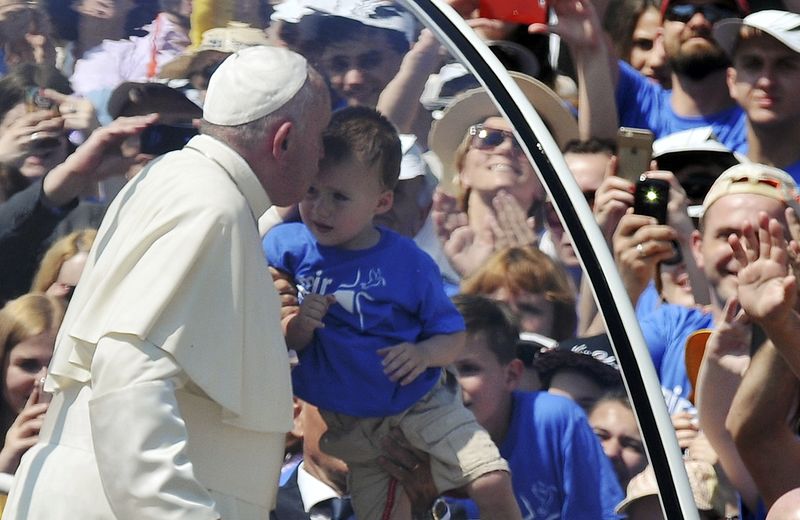By Philip Pullella and Maja Zuvela
SARAJEVO (Reuters) - Pope Francis urged Bosnians on Saturday to seek lasting ethnic and religious harmony to heal the deep, lingering wounds of the 1992-1995 war that devastated the former Yugoslav republic.
"The cry of God's people goes up once again from this city... War never again," he said at a Mass for some 65,000 people at the stadium of the city that was once a symbol of ethnic and religious diversity in socialist Yugoslavia.
This unwound in the war and Bosnia remains hamstrung by its legacy, divided along ethnic and religious lines.
Francis listed the sufferings endured by Bosnians, mentioning refugee camps, destroyed houses and factories, and shattered lives.
"You know this well, having experienced it here: how much suffering, how much destruction, how much pain!" he said, raising his voice as he read his homily in Italian.
The pope became emotional at a meeting in Sarajevo cathedral, where he heard personal stories of torture, including one by a nun who was kidnapped in 1993 by Arab foreign fighters who came to Bosnia to fight alongside the country's Muslims.
Her voice broke as she told how her captors threatened to kill her unless a priest in the same room trampled a rosary. He refused and both were beaten.
"This is the memory of your people. A people without memory has no future," Francis told the priests and nuns in spontaneous remarks, putting aside his prepared address. "Don't forget your history but not in order to get revenge but to make peace."
At a meeting with the three-member Bosnian presidency, Francis said peace initiatives between Bosnia's Croats, Serbs and Bosniaks showed that "even the deepest wounds can be healed by purifying memories and firmly anchoring hopes in the future."
Catholics, the vast majority ethnic Croats, account for about 15 percent of Bosnia's 3.8 million people. They share power with Muslim Bosniaks and Orthodox Serbs in an unwieldy system of ethnic quotas laid down by a U.S.-brokered peace deal in 1995 and plagued by nationalist politicking.
Francis arrived in the city whose skyline is dotted by mosques and churches days after the entry into force of a landmark EU agreement on closer ties with Bosnia, part of a new Western initiative to encourage political and economic change.
"It's easy to talk about peace," he told young Bosnians of all faiths whom he met just before leaving Sarajevo.
"Leaders across the world often talk of peace while they sell weapons and spread war. From you, the first generation of children born after war, I expect integrity and harmony between what you think and what you do - anything else is hypocrisy."
A multi-ethnic children's choir from Srebrenica, where 8,000 Muslim men and boys were killed in 1995 in the worst mass killing in Europe since the Nazis, sang a song titled "Love people".

"I expect you to build bridges that will be used for meeting each other," Francis told them.